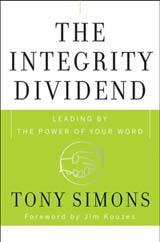 Stan Myers, president and CEO of SEMI, a global semiconductor industry association, tells the following story about the impact of keeping his word. When he was CEO of Mitsubishi Silicon America, he planned to move his R&D department from the San Francisco Bay area to Salem, Oregon. Many employees were not interested in moving.
Stan Myers, president and CEO of SEMI, a global semiconductor industry association, tells the following story about the impact of keeping his word. When he was CEO of Mitsubishi Silicon America, he planned to move his R&D department from the San Francisco Bay area to Salem, Oregon. Many employees were not interested in moving.
As an incentive, he offered a retention bonus to people who would stay the full eight months until the move and help to recruit their replacements. If they took another job before the eight months, they would get severance, but would not get the retention bonus.
One young engineer, Alan, got another job, did not get his retention bonus, and finance did not pay him his legitimate severance, which was several thousand dollars. He never asked for it. About a year later, Stan, the CEO, learned about the mistake. He had his people cut the check, found and visited Alan’s new workplace, and asked the president of the company to bring Alan up to the conference room for a conversation.
Alan came in and he said, ‘What are you doing here? I haven’t seen you for a while,’
Stan said, ‘Yes, Alan, but I wanted to tell you we forgot to pay you your severance.’
Alan was overwhelmed. More than 15 years later, Stan heard again from Alan. Alan had started up a successful company. He sought out Stan to present him with an engraved iPod Nano, thanking him for his leadership and friendship.
I draw two points from this story. One is that the simple act of keeping a promise can have a huge impact on a person. The second point is scarier: Alan did not expect his employer to keep his word.
The fact that Stan acted as he did struck Alan as extraordinarily unusual. CEOs are very busy. Nobody likes to admit a mistake. There probably would have been no fallout if the check had never been written. There would have been understandable reasons for Stan Myers not to have acted as he did. But the fact that he did says something about the man as a leader. And it helps to explain his great success in that role.
It’s easy to break a promise. It’s even easier to forget the price of breaking it. After all, who can measure that price? Few would deny that a broken promise lowers the morale of your employees, but what’s the real dollar cost – the bottom line impact? Or what is the payoff of keeping a promise? It should be simple to align your words and actions in a way that employees can see. But if it’s so simple why do most employees say their managers do not do it? Maybe it is not so simple.
Consider how two executives described to me the benefit of an impeccable word — and the cost of lacking one:
Good leadership is, ‘Whatever I say I’m going to do, I’m going to do.’ That means I have to know what my limitations are and what I’m capable of delivering. As a leader if you don’t fulfill your commitments, I can’t think of anything that can hurt you more than that. — Frank Guidara, President & CEO, Uno’s Chicago Grill
If your staff sees you cutting corners, then they’re not going to take you seriously. And then they’re not going to take the values that you’re trying to instill seriously. Because you’re not taking the values seriously. — Deirdre Wallace, President, The Ambrose Group
Like these successful executives, you, too, most likely want be an honest and respected leader. One thing that sets this book apart from others that discuss the importance of integrity is that it tells how I have been able to accurately measure its positive dollar impact. As you will see more in later chapters, successful executives I talk to recognize the dividend, too, but until now it has not been well measured.
I am not asking you to be motivated by any intrinsic payoff, though I think there are several. Integrity, for me, is about being more effective, because people see you as consistently following through on your word and demonstrating the values you profess: more effective as a leader, because you more readily capture the hearts of your followers; as a communicator, because people know you mean what you say; as a partner, because you can be counted on; as a customer because you complete business transactions more efficiently; as a supplier, because buyers can know what they will get; and as a brand, because you keep your promises — and promises are all that a brand is. Integrity contributes hugely to executive effectiveness.
Tony Simons, author of “The Integrity Dividend” is an associate professor at Cornell University where he teaches organizational behavior, negotiation and leadership. He is also a business consultant and speaker who focuses on trust in leaders, executive team member trust, and trust in supply chain relationships. He received his B.A. from the University of Chicago and his master’s degree and doctorate from Northwestern University. For more information, please visit www.integritydividend.com.
